Charm
The Elusive Enchantment
Joseph Epstein


An imprint of The Rowman & Littlefield Publishing Group, Inc.
4501 Forbes Blvd., Ste. 200
Lanham, MD 20706
www.rowman.com
Distributed by NATIONAL BOOK NETWORK
Copyright 2018 Joseph Epstein
All rights reserved. No part of this book may be reproduced in any form or by any electronic or mechanical means, including information storage and retrieval systems, without written permission from the publisher, except by a reviewer who may quote passages in a review.
British Library Cataloguing in Publication Information available
Library of Congress Cataloging-in-Publication Data available
ISBN 978-1-4930-3579-3 (hardcover)
ISBN 978-1-4930-3580-9 (e-book)
 The paper used in this publication meets the minimum requirements of American National Standard for Information SciencesPermanence of Paper for Printed Library Materials, ANSI/NISO Z39.48-1992.
The paper used in this publication meets the minimum requirements of American National Standard for Information SciencesPermanence of Paper for Printed Library Materials, ANSI/NISO Z39.48-1992.
Printed in the United States of America
For Georges Borchardt,
a charmer on two continents
Subtlety, discretion, restraint, finesse, charm, elegance, good manners, talent, and glamour still enchant me.
Nol Coward
The Nol Coward Diaries
It is absurd to divide people into good and bad. People are either charming or tedious.
Oscar Wilde
Lady Windermeres Fan
Contents
Introduction
Things can be charming, and animals often seem so, but the question of charm is most interesting in connection with human beings. Is human charm a gift from Godor, if one prefers, from the gods, or of the luck of the drawor is it a talent that requires development and cultivation? How does it function? Does it have a purpose? Might it be overdone? Can we live without it? Who needs it? Is it among the virtues; and if a virtue it be, is it a trivial or a serious one? Who has had charm? Who among us has it today? Is charm now in notably short supply? And if it isto ask the question is to assume it iswhy and how did this come about?
One can of course be charmed by landscapes, buildings, artworks, and so much more. I have myself in recent weeks been driving round the city of Chicago listening to songs written and sung by Johnny MercerIm Old-Fashioned, Moon River, Satin Doll, Summer Wind, and othersand find myself uplifted by them in the way that only uncomplicated music can raise ones spirits. I never pass Frank Lloyd Wrights Roby House on the University of Chicago campus without feeling elevated by its graceful lines; the same applies to the skyscraper known as the Hancock Building on Michigan Avenue. Merely coasting along the citys Outer Drive, the always changing waters of Lake Michigan to the east, also charms. The darkly comic poems of Philip Larkin and the novels of P. G. Wodehouse unfailingly charm me. For those with an eye for it, charm can be found in many places, but in this book I concentrate on charm in its human aspect, charm as conveyed by human presence, if only to delimit somewhat an already broad and sufficiently complex subject.
Neither do I take up the matter of charm in non-Western cultures: in China, India, Africa, and elsewhere. The only thing vaster than this aspect of the subject, non-Western charm, is my ignorance of it, and for this sound reason I have not taken it up. Besides, as an immensely charming writer named Max Beerbohm said in one of his essays about the need to take up a history of the 1880s, to give an accurate account of so complex a subject would need a far less brilliant pen than mine.
Almost everyone will recognize when he or she is in the presence of charm. Charm is magic of a kind; it casts a spell. In the presence of charm, the world seems lighter and lovelier. A charming person can cause you to forget your problems and, at least temporarily, to hold the worlds dreariness at bay. Charm is a reminder that the world is filled with jolly prospects and delightful possibilities.
Charm is a form of pleasure. One is charmed by another persons looks or personality or general artfulness of presentation. The spell that charm casts takes one out of oneself, lifting one into another, more exalted realm. Watching Fred Astaire dance, or listening to Blossom Dearie sing, or reading the poems of C. P. Cavafy, or merely looking at Rita Hayworth or Ava Gardner, one recalls that the world can be a pretty damn fine place. To be charmed is sometimes to be swept up, blown away, enraptured; at others, to be quietly satisfied, left calmly contented.
Tastes in charm differ vastly. Some are charmed by the merely cute; for others only the exquisite charms. The Three Stooges do it for some, the drawings of Albrecht Drer for others. A lucky few are charmed by both and much else in between. Ask a person what charms him and you will learn a fair amount about him.
Charm needs to be distinguished from ecstasy and other, higher-powered conditions and states. In the famous distinction between the Apollonian and the Dionysian, based on the reputed interests of the gods Apollo and Dionysus, the Apollonian is bright, lucid, reasonable, ordered, while the Dionysian is ecstatic, intoxicated, chaotic, reaching for the sublime, bringing on the fires and dancing girls. The Apollonian seeks the light, the Dionysian thrives in the dark. Alexander Pope, Reynaldo Hahn, Paul Valery, the draughtsman Sempr are Apollonian; Wagner, Baudelaire, Samuel Beckett, Lucian Freud are Dionysian. Charm tends overwhelmingly to be Apollonian.
That charm seeks the light does not mean that charm itself needs to be light, or, as we should now say, lite. Charm is calm, rarely agitated; cool, almost never hot. Charm is graciousness in action; it is never going too far, pushing too hard, staying too long. Some charm is natural, some artificial, though the two categories are not always as distinct as one might imagine. I am, said Maurice Ravel, composer of some of the worlds most charming music, naturally artificial. And so he was, and in him it worked, charmingly.
Charm is elegance made to seem casual. Charm comes across as at ease in the world. It is virtuosity of personality. Charm is a performance art; behind it is the deliberate decision to be pleasing to others, or, in some cases perhaps, to a selected few. Charm is, or at least often can be, a gift, one that its possessors bestow on others.
Asked to define charm, most people are unable to do so. As I begin to write this book, I am myself less than certain how to define charm. Some might say it is suavity, a kind of confident elegance, and suavity can sometimes be charming, but charm is larger than mere suavity. Others, overestimating charm, say that it is personal charisma. But charisma is much greater than charm; it operates in a much larger arena than charm, while charm tends to operate on a more personal level.
The definition of charm, as with the definitions of all magical things, is elusive. Some people confuse charm with simple courtesy, generosity, thoughtfulness. (A person can be immensely likeable without being especially charming.) All these things are good in and of themselves, but they do not constitute charm. Charm has an element of delight beyond mere niceness. Charm can even be dangerous, as in the case of charming seducers, frauds, and tyrannical politicians, men and women who use charm to maneuver, to manipulate people.
The Oxford English Dictionary defines charm as the power to give delight, or arouse admiration. If a motive behind charm is needed, perhaps it can be established by slightly tweaking the OED definition to read the power to give delight in order to arouse admiration. He turned on the charm, we say. His charm escapes me, we also say. Some, of course, might say it about the very same person. For charm is in the eye of the beholder, and the saddest thing, the gravest error in the social realm, is to overestimate ones own charm, a serious faux pas all would-be charmers are in danger of committing.
Next page
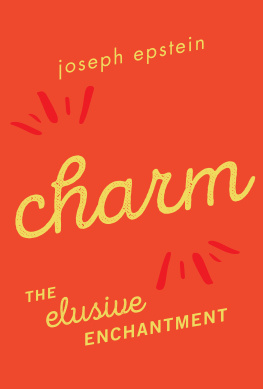
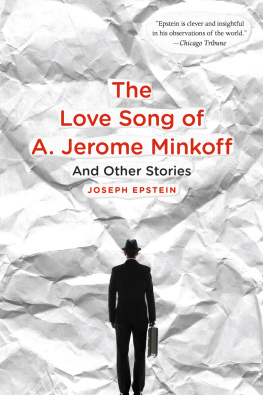


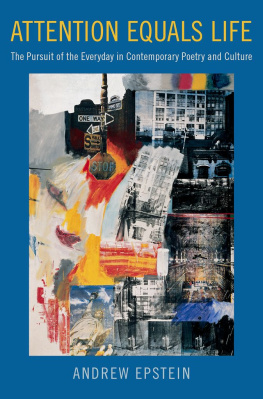
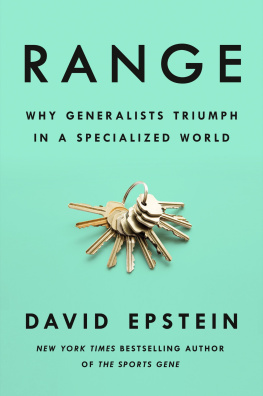


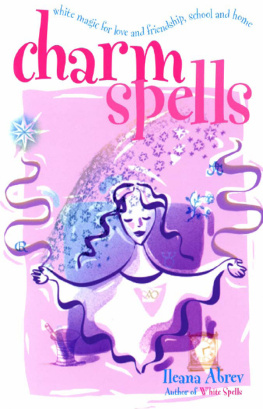

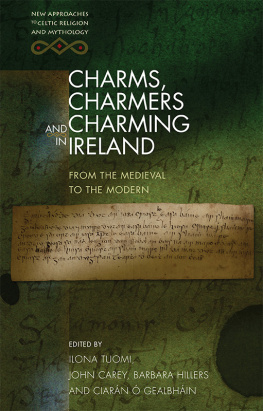



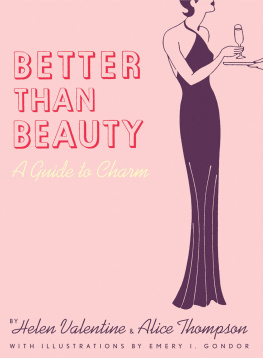
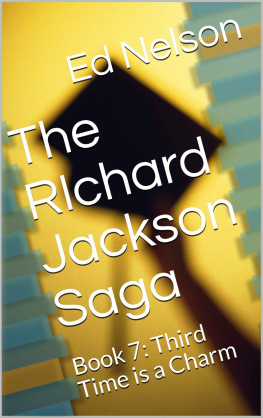




 The paper used in this publication meets the minimum requirements of American National Standard for Information SciencesPermanence of Paper for Printed Library Materials, ANSI/NISO Z39.48-1992.
The paper used in this publication meets the minimum requirements of American National Standard for Information SciencesPermanence of Paper for Printed Library Materials, ANSI/NISO Z39.48-1992.